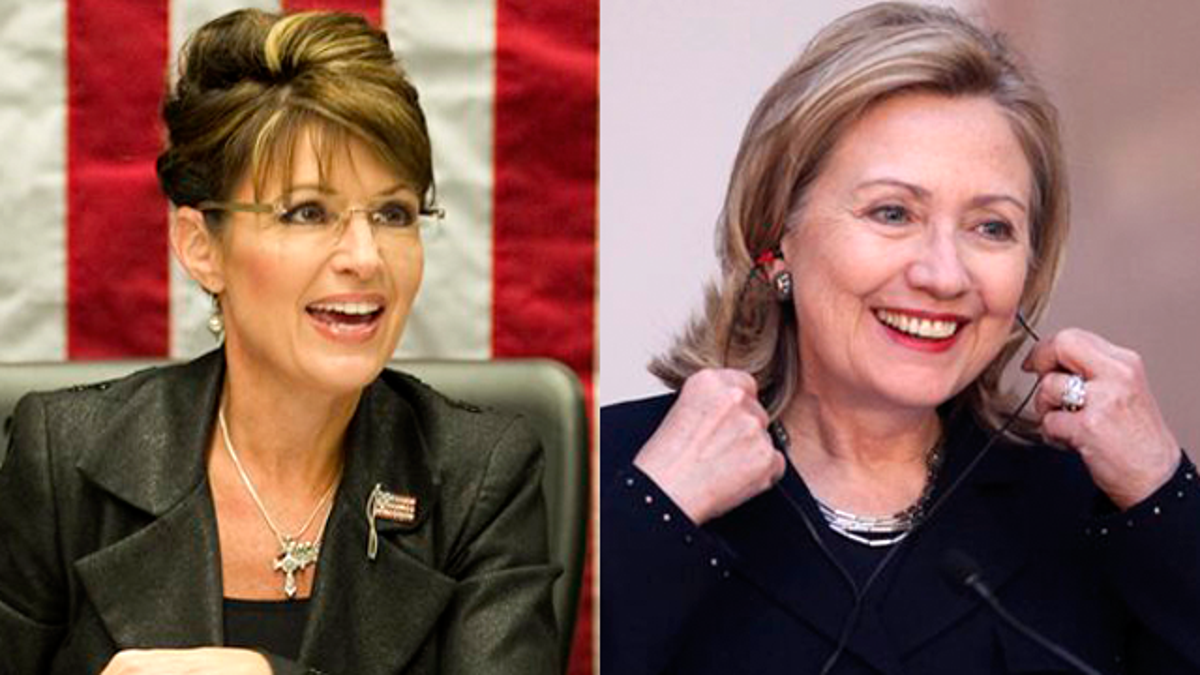
Sarah Palin and Hillary Clinton. (AP)
The documentary "Missrepresentation," directed by Lieutenant Governor of California Gavin Newsom's wife Jennifer Siebel Newsom, explores how mainstream media undermines American women in influential positions, and the impact this makes on young girls.
It also challenges what it says is the media's often disparaging portrayal of women. In particular, "Missrepresentation" devotes quite a bit of time to how Sarah Palin and Hillary Clinton were covered by mainstream media in the 2008 presidential elections.
"The idea for the film came to me as I watched the 2008 presidential campaign and saw this sexism and double standard that was directed towards Hilary Clinton and Sarah Palin, and some of the wives whose husbands were running for office. It really upset and affected me," Siebel Newsom told FOX411's Pop Tarts at the premiere in Park City, Utah over the weekend. "I knew I wanted to have children someday (she now has a two-year-old daughter and is pregnant with a son) and I was worried about raising a daughter in a world that objectifies women to such an extreme."
Lt. Gov. Gavin Newsom concurred, saying Palin was treated abominably.
"We need a greater sensitivity to the way we portray women particularly in the news media. To watch the way Sarah Palin was treated -- to discuss whether an elected official or former elected official has breast implants -- is pretty demeaning, and it would never happen to a guy," Newsom said. "We need to disassociate ourselves from this party ideology. It is not a Republican vs. Democrat issue. This happens all around and puts so much pressure on young girls."
The documentary notes that while women make up 51 percent of our population, their presence in Congress is only 17 percent, ranking the United States 90th in the world when it comes to percentage of women in office.
Former "Melrose Place" star Daphne Zuniga, interviewed in the film, said Hollywood is also to blame, as it promotes and fixates on unrealistic physical standards for women.
"As someone who has been in Hollywood for 25 years I can only speak from personal experience, and I do think in some ways we are moving backwards with the treatment of women," Zuniga told Pop Tarts. "This issue has nothing to do with politics. It is an issue that impacts everyone."
"Missrepresentation" criticizes Hollywood for promoting Angelina Jolie and Madonna as exemplars of "empowered women" when they too are most often hypersexualized. Prominent feminist and writer Gloria Steinem, interviewed in the film, told Pop Tarts that the treatment of women has become so ingrained in society that we barely even recognize it.
"It's so common that it is hard to notice," she said. "One thing we can always remember is to lead by example. Every time you or I go past a mirror and say 'I'm too fat' remember a girl is watching."
"Missrepresentation" interviews an array of high-profile women including actresses Geena Davis, Rosario Dawson and Jane Fonda, comedian Margaret Cho, former Secretary of State Condoleezza Rice and CBS news anchor Katie Couric.
And while Couric is against women in television being required to look overly sexy, she feels guilty that she may have contributed to the "showing of the legs" shot so prevalent in newscasts today.
"It is something I do worry about, that I started the thing with the legs. I look back at some of my 'Today' interviews and my skirt was way too short," Couric said in the film.
So what is the film’s solution to the media’s problematic portrayal of women?
"It is extremely important that we champion good media and in some cases boycott bad media. Women hold more than 86 percent of America’s purchasing power, and we have to use our power as consumers. We have to write our corporate media leaders to encourage socially responsible business practices," Siebel Newsom said. "We need to connect the dots for our political leaders so they might advocate for better policies for women and improved media. We have to build community among individual women and girls. It comes down to the fact that we have to be the change we wish to see in the world."






